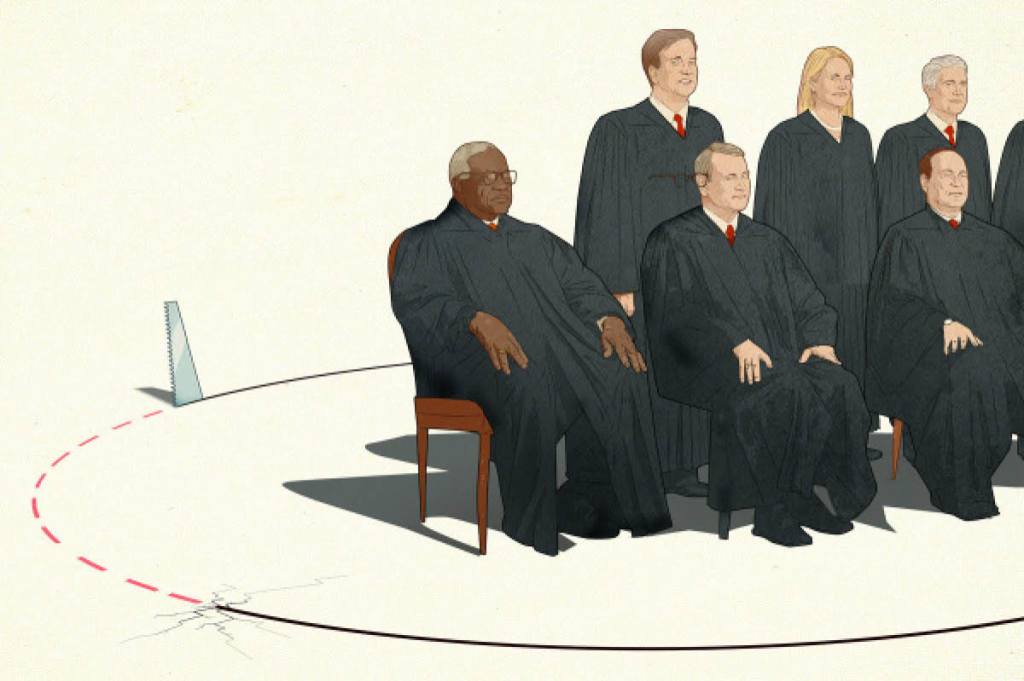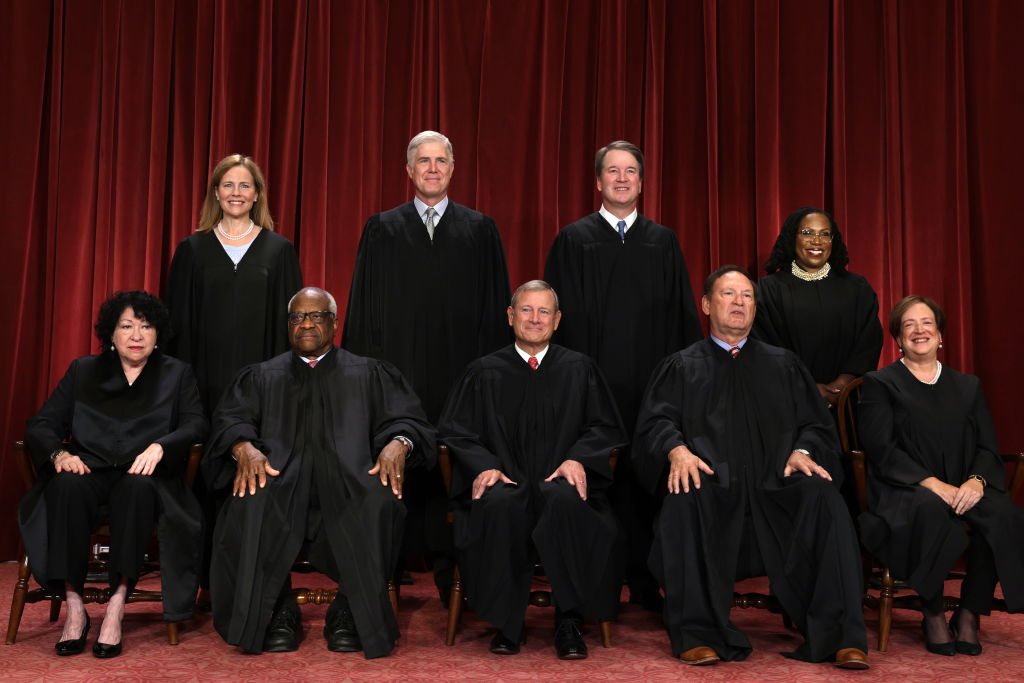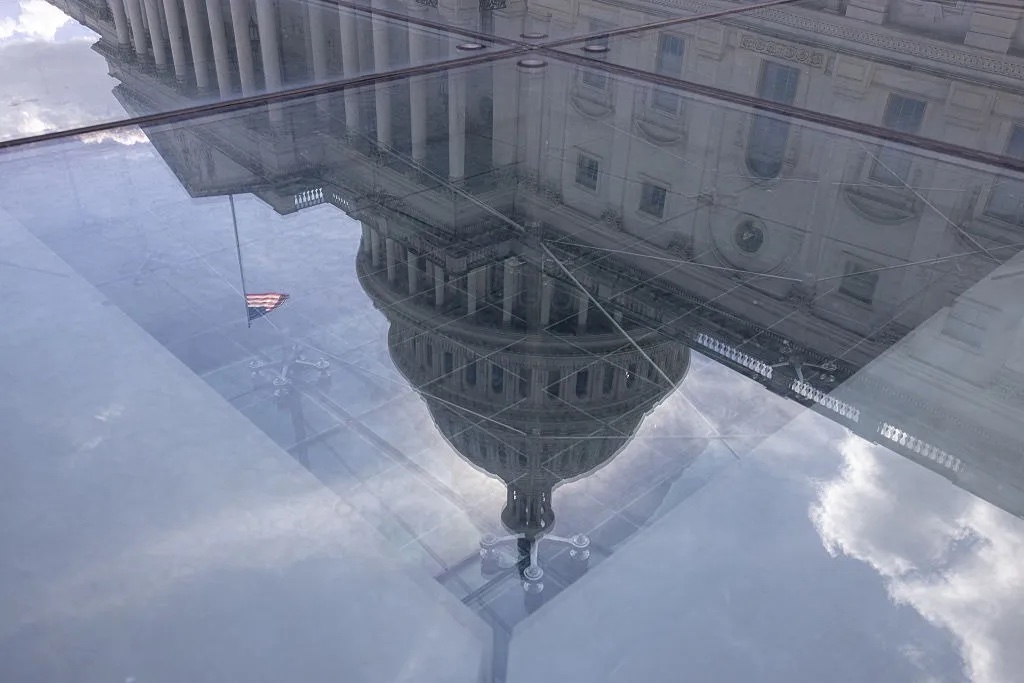In the basement of a Washington, DC restaurant, 200 ticket-purchasing fans have gathered to witness the live recording of a multifaceted conversation about the villainy and corruption of the Supreme Court, and one justice in particular. It only seems appropriate to order the shrimp and grits: it costs $19.99 and comes with a white-wine tomato sauce. This may seem rather hifalutin, but it also comes in a glass mason jar that references tired hipster kitsch — perfectly suitable for a live podcast hosted by Slate.
Shrimp and grits are the uptown incarnation of staples from the Carolina Lowcountry, where the Gullah Geechee people, who live on the Sea Islands along the coast of the Carolinas and Georgia, would catch small creek shrimp in their bare hands to eat themselves or sell on the streets of the cities and towns. Grits, from ground dried corn, have a more troublesome history: they were distributed by slaveholders as part of slaves’ food allowances. Historical records show Carolina slave children would get one pint of grits a day for most of the year, with salt.
Clarence Thomas’s mother tongue was not English, but Gullah — a lilting language that sounds like music, a mysterious linguistic cocktail of English, Creole and West African. (Experts disagree on its exact origin.) Thomas was born in 1948 in Pin Point, Georgia, the second child of Leola Williams. His father abandoned them when he was two. When he was six, his younger brother accidentally burned down the shack they lived in, and they were both sent to be raised by his grandfather in Savannah.
This is the origin story of today’s most hated Supreme Court justice, if you poll the Slate audience. It is also the main focus for a well-funded, well-organized Democratic campaign to put the Supreme Court under siege — not just in the press, but in the public too. And many on the left seem to like it that way. If you can’t transform the judiciary through the process of government, transform it by making it a job people are afraid to take.
In March 2020 Senate Minority Leader Chuck Schumer stood surrounded by protesters and pointed at the Supreme Court Building, bellowing: “I want to tell you, Gorsuch. I want to tell you, Kavanaugh. You have released the whirlwind and you will pay the price. You won’t know what hit you if you go forward with these awful decisions.” Since then, the last of the three branches of government with respect for norms has indeed been at the center of a whirlwind — even as Democrats repeatedly claim to be the stalwart defenders of democracy, norms, the Constitution and the rule of law.
When the draft opinion in Dobbs v. Jackson Women’s Health Organization — the most significant culture-war decision in a generation — was leaked, the justices’ families and children were mapped and targeted, and their homes picketed illegally without any reaction from Merrick Garland at the Department of Justice. A twenty-six-year-old man even traveled across the country intending to murder Brett Kavanaugh and his family. He showed up on the justice’s suburban street with a Glock-17 and a plethora of tools — zip ties, duct tape, a tactical knife, pepper spray, a crowbar and padded boots for stealth. With last-minute misgivings, he called 911 and told the operator he had traveled from California “to kill a specific United States Supreme Court justice.” His online messages showed he had wanted to kill as many as three; he had conducted internet searches for “most effective place to stab someone,” “assassin skills,” “assassin equipment” and “assassinations.” He was arrested and indicted — he pleaded not guilty and is awaiting trial. (Authorities still claim to have no idea who leaked the opinion.)
In the opening episode of a podcast series focused on Clarence Thomas, Slate host Joel Anderson begins with his own peaceful version of a home confrontation. In “America’s Blackest Child,” he knocks on the screened-porch door of a modest single-story white house on a Savannah street. The ninety-four-year-old Leola Williams, happy to oblige a visitor, welcomes Anderson inside, where he discovers the shocking scene you would expect from any proud Southern mother: pictures of her family, including her son Clarence, covering the walls.
Anderson sounds awkward in the podcast audio from Mrs. Williams’s home, as if he knows he’s crossed a line. But he showed no such qualms when he appeared on television with MSNBC’s Mehdi Hasan to promote the episode, instead expressing surprise there was no security to stop him outside the house. “If they had had a chance to tell me to not come, they probably would have, but when you show up it’s hard to turn someone away from your front door,” he said. The MSNBC segment is mostly devoted to accusing Thomas of being a hypocrite for his anticipated ruling against affirmative action in Students for Fair Admissions, Inc v. Harvard. (Thomas joined the 6-3 majority in the decision announced on June 29.) Speculating on his likely vote, Hasan described it as an example of a minority “pulling up the drawbridge after themselves.” Asked why Thomas would choose to become a member of the “radical right,” Anderson had the answer: “He wanted to make money.”
Money is central to the story the left wants to tell about Thomas and the Supreme Court more generally. As is this little white house in Savannah. A ProPublica investigation revealed this spring that billionaire conservative Harlan Crow bought the property from Thomas and his family several years ago.
The relationship between Thomas and Crow, a major Republican donor the justice and his wife Virginia say is a close friend they’ve known for years, has been the primary focus of ProPublica’s “Friends of the Court” series, which seeks to pin all manner of ethical lapses and alleged inappropriate and illegal behavior on conservative justices.
ProPublica’s work has been the centerpiece of a flood of reporting across multiple media outlets focusing on what is being framed as a Supreme Court irrevocably compromised by relationships with well-heeled benefactors. The original series is a slog of filings and reports interspersed with vacation photos dug up from corners of the internet and quotes from various ethics experts — who also are of the left — denouncing the dire nature of a corrupt court.
At first glance, many of these stories look pretty bad. They paint a picture of lifetime-appointed justices palling around with powerful billionaires who shepherd them on fishing trips and to hunting lodges, take them on vacations to exotic locales and contribute indirectly or directly to supporting their legacies. It’s not a pretty picture. Yet even slightly closer inspection reveals that there are enormous reasons to take the breathless reporting with a pinch of salt.
The best example yet of the absurdly disproportionate reporting came in an over-the-top piece by Stephanie Kirchgaessner of the Guardian. The article revealed that seven Washington attorneys had used Venmo to send Christmas party money to a top aide of Thomas’s. Noticeably absent from the hair-on-fire “conflict of interest!” piece were the amounts in question, which turned out, according to one of the payers, to be $20 for an annual “lunch buffet consisting of hot dogs, hamburgers and chicken tenders” held for Thomas’s former clerks. Scandalous!
Then there’s the travel. The Judicial Conference, the administrative body which sets the rules for things such as travel disclosures, requires justices to report where they go, when they went and the nature of expenses, but not total costs. They are not required to disclose “any food, lodging or entertainment received as ‘personal hospitality of any individual.’” The rules further define the scope of hospitality: “hospitality extended for a non-business purpose by one, not a corporation or organization… on property or facilities owned by [a] person.”
The argument that the loophole should be smaller might be valid, but the rules are what they are. Demanding justices retroactively report something they weren’t required to report at the time is absurd — ex post facto rulemaking, if you will — and implying they were doing something untoward by following the rules as written is disingenuous. And it’s clear enough that justices of many stripes have long proceeded by the ethics rules as they stand.
The New York Times acknowledged in their editorial on the issue that “Justice Stephen Breyer took at least 225 subsidized trips from 2004 to 2018, according to data compiled by the Center for Responsive Politics, including trips to Europe, Japan, India and Hawaii… Justice Ruth Bader Ginsburg got a private tour of Israel in 2018 that was paid for by an Israeli billionaire, Morris Kahn, who has had business before the court.” And OpenSecrets reported that the top two trip-getters in 2021 and 2022 were tied, with Justices Amy Coney Barrett and Elena Kagan both at eight. So yes, both sides do it.
In fact, the single most overlooked story in recent years may relate to the Notorious RBG. According to the Washington Free Beacon, a $1 million prize given to her by the left-leaning globalist Berggruen Institute raised eyebrows (the Judicial Conference limits honoraria to $2,000), but RBG said she would instead donate the amount to a variety of charities. Only later did it become clear that she had wanted the list of recipients to remain hidden, and Berggruen complied on its requisite Form 990 — preventing the public from knowing if any of the recipients had business before the court.
Republican senator Mike Lee raised the issue in a July Judiciary Committee hearing on a court-targeting bill backed by Democratic senators Sheldon Whitehouse and Dick Durbin. “This might have some very significant ramifications if she was still serving on the court,” Lee said. “We don’t yet know exactly what was done with that, whether she carried out the apparent intention of the stated purpose of intent at the outset to donate it to charity.”
As for that house in Georgia: Crow’s spokesman has said he ultimately wants to turn Thomas’s childhood home into a museum, “telling the story of our nation’s second black Supreme Court justice.” Thomas’s share of the sale was a third of $133,000, and it’s still not entirely clear if he even reported it incorrectly, though he reportedly intends to amend it as necessary.
The longer this spasm of investigative reporting goes on, the more desperate it sounds. The Washington Post devoted a 3,300-word hit piece on the effort spearheaded by the Federalist Society’s Leonard Leo to honor Thomas on the twenty-fifth anniversary of his appointment. The public relations campaign was designed to push back against a fictionalized HBO glorification of Anita Hill, who testified against Thomas during his confirmation hearings, and included the promotion of a documentary, Created Equal: Clarence Thomas in His Own Words.
The Post paints this entirely typical PR campaign in dark, secretive terms, even drilling down to investigate a “Justice Thomas Fan Account” which posted clips and quotes from the justice. “The account’s posts about the justice generated nearly 21,000 impressions,” the Post reports — a laughably small amount, no offense to the earnest creator.
The Post has yet to conduct a similar deep dive into the promotional campaign around the 2018 documentary RBG, which was acquired and distributed by Participant Media, a production company with an explicitly leftist activist mission founded by Canadian billionaire and former eBay president Jeff Skoll, who has given millions to leftist causes. Nor have they shown any interest in investigating the promotion and creation of the 2018 dramatic film, On the Basis of Sex, based on a script by Ginsburg’s nephew, and starring Felicity Jones and Armie Hammer (though the Post’s Style section did publish a meet-cute piece titled “That time Ruth Bader Ginsburg checked out Armie Hammer,” doing their part to promote the film’s Washington premiere). Participant Media also produced this laudatory fictionalized biopic for roughly $20 million, though it’s unclear if that amount also paid for the movie’s promotional pop rap “Here Comes the Change” performed by Ke$ha, with official artwork by Shepard Fairey, or the Jonas Åkerlund-directed music video, which as of this writing has 818,000 views on YouTube — tragically, the fewest of any Ke$ha music video.
Stepping back from all of this, what we see is a series of breathless reports designed to inflate perceptions of bias without the facts necessary to establish anything of the sort. At most, justices may have to refile forms or clarify their reporting to the ethics body. Due to a change in policy by the Judicial Conference this spring, they’ll also have to report when they fly on a private jet — something they didn’t have to do before. But if that’s all you think it takes to buy a Supreme Court justice, imagine what Hunter Biden could get you for $5 million.
“All these breathless ‘investigations’ amount to nothingburger concern-trolling of justices whose opinions progressive activists don’t like,” said Ilya Shapiro, director of constitutional studies at the Manhattan Institute and author of Supreme Disorder: Judicial Nominations and the Politics of America’s Highest Court. “The left simply can’t stand that a majority of the Supreme Court is finally, after decades of hand-waving, interpreting the Constitution based on what it says instead of nebulous conceptions of social justice.”
At the Slate podcast taping, Anderson’s first guest of the night was Rhode Island senator Sheldon Whitehouse, of course — his Democratic colleague, Illinois senator Dick Durbin, was supposed to be there too, but he came down with Covid. Anderson’s first question jumped right to the point: given all the horrible things now established about Clarence Thomas, he asked: “So Senator Whitehouse, do you think he should resign?”
“In all decency, he should,” Whitehouse said, to applause. “But there’s just no world in which that happens that I can foresee. He’s just that determined to stay there and make his points and exercise his resentments.”
The senator, infamous for his membership in an all-white Rhode Island beach club, is promoting his book, The Scheme: How the Right Wing Used Dark Money to Capture the Supreme Court, describing “an evil spiral back and forth” bent on the “court capture” of the judiciary.
“I told my caucus, the Senate caucus, that we have a problem with the Supreme Court: it’s now a political organization, we have to treat it as such. And I basically got booed back into my chair,” Whitehouse said. “I got told ‘oh, no, no, the Supreme Court relies on public confidence, we can’t possibly do that.’ So I realized I had to do my homework. And that’s where… the book and all of that came from. Prove your case, write your prosecution memo.”
In Whitehouse’s frame, an “omertà” of secretive groups funded by malevolent billionaires — whom he tags as fossil-fuel interests bent on preventing bipartisan climate-change policy — are operating the court like shabby robed puppets.
“We don’t know all of that yet,” Whitehouse said. “I think we’re going to find out a lot more.” Invited to make the case for his latest piece of legislation targeting all of this (is this a Slate podcast or a Democratic activism group?), Whitehouse calls it “one of the silver linings of this set of really sickening revelations about the Supreme Court.”
“This is a multi-front battle,” Whitehouse said. “Moving the legislation forward, I think we’ll hit tipping points as the behavior of the Supreme Court justices becomes more well known, as further revelations come. We’re preparing for that moment.”
There’s little subtlety in Whitehouse’s comments to a friendly DC crowd about the degree to which the activity swirling around the Supreme Court is an ideological information operation. Democratic politicians have all the reason in the world to promote the effort to do so: the biggest funders of their partisan priorities are all paying for it.
Of the justices targeted in the recent spate of hit pieces, Samuel Alito has been the most aggressive in pushing back. He wrote a prebuttal op-ed in the Wall Street Journal after ProPublica sent him a series of questions inquiring about a fishing trip he took as a guest of right-leaning billionaire Paul Singer. Alito’s response was thorough and ruthless, detailing the skewed and inaccurate framing of the piece and prompting ProPublica’s story to be redrafted, with an explainer for the “Unprecedented Wall Street Journal Pre-buttal.”
If leaking Alito’s opinion in Dobbs was supposed to have cowed the justice, it clearly hasn’t. “Those of us who were thought to be in the majority, thought to have approved my draft opinion, were really targets of assassination,” he told the Journal in April. “It was rational for people to believe that they might be able to stop the decision in Dobbs by killing one of us.” The experience prompted the justice to be more confrontational. If he were a meme, one former clerk joked, Alito would be Michael Jordan in The Last Dance: “And I took that personally.”
Whitehouse and his fellow leftists would do anything to alter the conservative course the court has taken in recent years — even radical steps like court-packing. In the fall of 2019, along with four other Democrats on the Senate Judiciary Committee, Whitehouse sent a brief to the court on a New York gun rights case. “The Supreme Court is not well, and the people know it,” they warned. “Perhaps the court can heal itself before the public demands it be ‘restructured.’”
For Whitehouse and those who would blow up the Supreme Court, dark money spent to this end is the good kind, and the activist groups and the journalists they push to echo their priorities are the noble pursuers of truth. The Judicial Crisis Network is a conspiracy, but progressive organizations like Fix the Court and Demand Justice are pure crusaders. The conservative Federalist Society is evil, but the leftist American Constitution Society is good. What this effort seeks to establish is a mutually justifying feedback loop. Democratic senators level severe allegations, activists parcel fever swamp stories to the press who then report on it, allowing the senators to point to these reports as legitimizing what was claimed in the first place.
Assisting in this effort are multiple billionaire-funded advocacy groups, bent on echoing the case for extreme measures to transform the court. They include Fix the Court, a spinoff from the New Venture Fund, managed by for-profit company Arabella Advisors, the center of the left’s dark money network — it spent over $1 billion in liberal efforts in 2020. Demand Justice, another Soros-backed group, was more explicitly focused on the push to pack the court — its board includes Elie Mystal, an MSNBC commentator who is most famous for calling the Constitution “trash.”
“While Whitehouse is championing supposed ‘ethics reform’ at the Supreme Court, he himself has sponsored environmental legislation pushed by the Ocean Conservancy, a group that has paid his wife as a consultant and policy advisor for years,” JCN president Carrie Severino said. “This isn’t about ethics for Whitehouse, but rather increasing the number of tools the left has at its disposal to intimidate the conservative members of the court.”
The central role of ProPublica should not escape notice. It was founded and continues to be funded by the Sandler family of San Francisco, who sold their bank Golden West to Wachovia right before its ludicrously profitable collection of dubious adjustable-rate mortgages played a central role in the 2008 financial crisis. Their family foundation is a huge backer of leftist causes, including the Center for American Progress, Human Rights Watch and Earthjustice.
Today ProPublica is also backed by a who’s-who of partisan Democratic billionaire donors, including George Soros, Pierre Omidyar, Laurene Powell Jobs, Donald Sussman and, until it was compelled to return the first tranche of a $5 million donation, notorious crypto bro Sam Bankman-Fried. All this billionaire largesse helps ProPublica pay top dollar for staff — its editor in chief currently makes more than $100,000 more each year than a justice of the Supreme Court.
For some reason, these billionaires don’t raise the hackles of Sheldon Whitehouse or Joel Anderson, or lots of others who are likely to tune into a multipart Slate podcast framing Clarence Thomas as a man who sold out black people for white money. Or, as one of the night’s other guests proclaimed of Thomas’s long ago divorce, “trading the black doll for the white doll.” There are hoots, laughs and murmurs in response.
At the opening of the show, Anderson led off with an odd extended monologue focused on Thomas’s high-school sports prowess, interspersed with audio from interviews with multiple figures from his past, most of whom spoke in praise of his arm strength with a football and gift for quick passing on the basketball court. The audience laughed when they are told he tried out for the Holy Cross football team but that he struggled taking hits; Anderson closes by expressing skepticism that the 5’8″ Clarence could ever dunk. The audience claps.
They clap to confirm each other in their viewpoints. To remind each other that anger at the Supreme Court, over abortion or affirmative action or everything else, isn’t a mark of Democratic impotence or foolish mismanagement of the filibuster or RBG’s refusal to retire under Obama, you see — it’s those evil fossil-fuel billionaires like Harlan Crow who are to blame. Because as the good Senator Whitehouse, a son and grandson of ambassadors and bishops, assured them at the podcast party, it’s Thomas who is a creature of “resentments.” It’s the skinny Gullah kid who ran through the Lowcountry scrub, the place where his ancestors ate their pint of grits and the creek shrimp they could catch, boiled in the brackish salt water for flavor. That kid is the one who took the wrong lesson from the American experience, who wants to pull up the drawbridge behind him. You see, you understand. He’s the resentful one. We can all agree about that.
There is no apparent awareness that the persecution of Thomas is rooted in their resentments: not of his rulings as such, but the fact that he survived the full force of their apparatus, that his origin story is his survival. They have to destroy him because he exists: because the force of the counterexample shows them to be impotent, shows there is another path. It is a species of derangement. As a threat, Clarence Thomas is literally existential. Of course Clarence Thomas can dunk. He’s been dunking on these folks for years. All they can do is podcast about it.
This article was originally published in The Spectator’s September 2023 World edition.

























